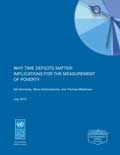
Publications
Why Time Deficits Matter
Implications for the Measurement of Poverty

Customarily, income poverty incidence is judged by the ability of individuals and households to gain access to some level of minimum income based on the premise that such access ensures the fulfillment of basic material needs. However, this approach neglects to take into account the necessary (unpaid) household production requirements without which basic needs cannot be fulfilled. In fact, the two are interdependent and evaluation of standards of living ought to consider both dimensions.
This report provides an analytical and empirical framework that includes unpaid household production work in the very conceptualization and calculations of poverty: the Levy Institute Measure of Time and Income Poverty (LIMTIP). Based on this new analytical framework, empirical estimates of poverty are presented and compared with those calculated according to the official income poverty lines for Argentina, Chile, and Mexico. In addition, an employment-generating poverty-reduction policy is simulated in each country, and the results are assessed using the official and LIMTIP poverty lines.
The undertaking of this work was initiated as a result of joint discussions and collaboration between the Levy Economics Institute and United Nations Development Programme Regional Service Centre for Latin America and the Caribbean, particularly the Gender Practice, Poverty, and Millennium Development Goals areas. It addresses an identified need to expand the knowledge base, conceptually, analytically, and empirically, on the links between (official) income poverty and the time allocation of households between paid and unpaid work.
Supporting documents:
Executive Summary
Appendices
Excel Tables for Chapters 2, 3, 4, and 5
The Distribution of Income and Wealth
Gender Equality and the Economy
